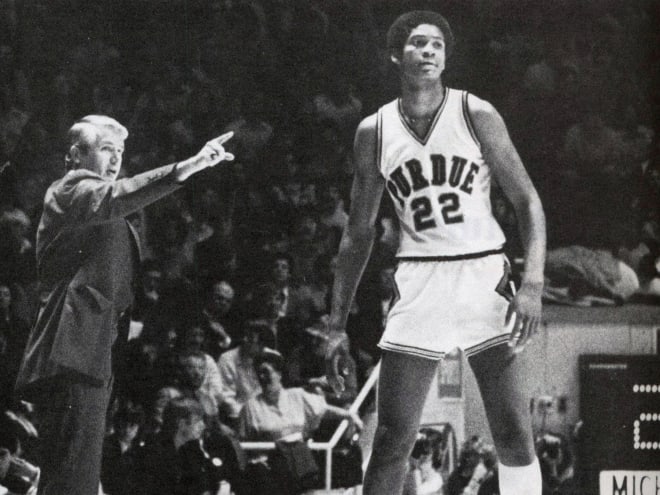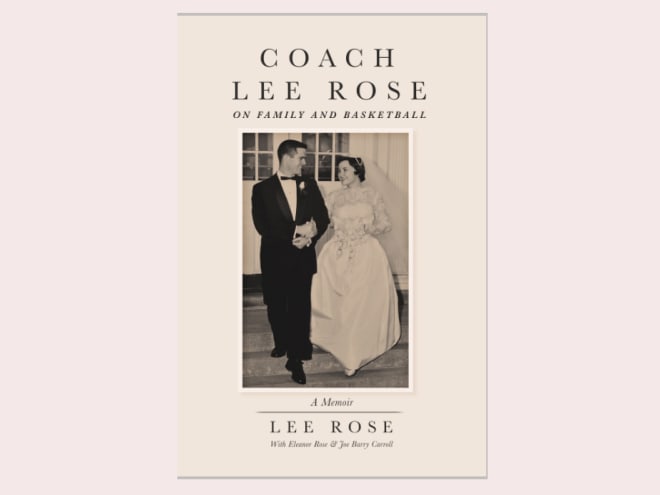Quarantine reading: Carroll's new book on Lee Rose

Related: Run From Nowhere (2009 story) | Memories of Purdue's 1980 Final Four Team (2018 story) | Hallman recalls Final Four | Sweet 16 Memories: 1980 | The Final Four Formula (2016 interview with Lee Rose | Billy Keller talks Final Four memories (2019 Gold and Black Radio podcast) | Rose has empathy for Painter (2010 story) | 40 Years Ago (2020 story) | Keller talks Lee Rose, Final Four Memories (2020 Gold and Black Radio podcast)
The following is an excerpt of an interview with Joe Barry Carroll on "Gold and Black LIVE" where Carroll spoke about the new book he published "Coach Lee Rose on Family and Basketball." The memoir was released late in 2019.
Gold and Black: People have to read here in the next several weeks, so let’s talk about your new book Coach Lee Rose: On Family and Basketball. Tell us how it all came about.
Joe Barry Carroll: I was advising coach (Rose) on working on his memoir with another publisher, and that didn’t happen. So I offered it to him if he wanted me to do it, and he said yes. He and Eleanor (Rose) wrote it, and we began to get on a conference call every Tuesday morning and talked it up. Coach is a big, big note taker, so we had most of the material already down. It was just a matter of organizing it.
Gold and Black: How much editing or how much did you have to work through to get things just so?
Carroll: In some places, you have to ask into the detail of a statement. Like if he said he crossed the street, I’m asking him and getting into all these analysis of why he crossed the street. Coach is an intellectual, but he’s plain-spoken mostly. So he may just respond to me, “Well hell, I just wanted to be across the street!” We had to go through unpacking some on the simple things.
Gold and Black: He obviously tells an interesting story about his time at Purdue and growing up. But what did you learn most about him when you dug deeper into his entire life?
Carroll: We never broke communication after we (both) left Purdue (in 1980), me to the NBA and him to South Florida, so we’ve been talking on and off (for years). There were some things that I just didn’t know about, in terms of historical things. We’re talking and all of a sudden, he’s telling me about how he went to the Truman Library and had a reception with the former President, Harry Truman. That was a pretty impressive thing to me. Certainly his birthday being during the days of the Cuban Missile Crisis, and he’s talking about the emotional turmoil with that.
As well as how romantic he is. I never got a glimpse of that when I was playing. He really has a deep and sacred relationship with his family, his wife and his children.
Gold and Black: The whole book is a love story, and the book is a story of Lee’s devotion to wife Eleanor and how they work together over the years and make decisions.
Carroll: I felt that that should be the centerpiece of it all. I wanted the book to read more like a novel, as opposed to yet another basketball book. He’s a distinguished coach, and I always think that the people that played for Lee Rose see him like a John Wooden-like quality of coach.
He is a great coach, and we know that. I wanted to get into the whole person, and he gave it to me. It was really great to hear about his approach to things. And some of the challenges he faced at Purdue centered around him trying to create some balance with his family and his professional responsibilities.
Gold and Black: Purdue fans would be interested in this book because it reflects on his memories, not only the good, but the reasons why he left Purdue. He also talks about the hard balance of being a college basketball coach, and he was always striving to get that done. Do you think that was something, at the end of the day, he accomplished?
Carroll: Like any of us reflecting on their lives, I think he’s still working through it. It’s emotional for him when talking through some of the things and why they happened and what he would do differently.
And I think people are really curious about what happened at Purdue. It’s a centerpiece to his career. Purdue benefited greatly from this.
And I tell him this all the time, but he made a huge difference to me as a player. I had an 11-year professional career, and my trajectory of my life and career are so different playing under him as my coach and my teacher that it would have been otherwise. After my first two years at Purdue (under coach Fred Schaus), I probably would have been good enough (to play in the NBA), but I probably would have been a journeyman player.
Gold and Black: I thought an interesting theme throughout the book was that it was not all about glory and all the great things he did. He talked about some of the challenges and choices he had to make. It does not read as a “everything was perfect”.
Carroll: He tries to have balance everywhere. I really had to push to get him to speak in a full-throated manner about the achievements because he is old school, and I feel like he thinks the achievements speak for themselves.
We went to the Final Four, and from his perspective, that’s all that needs to be said. But I’m saying to him like, 'no, this was a really big deal.' And in the 40 years since, Purdue’s had some really great teams, but none of them have made it there. I think there a bit of his old-fashioned pride and character that created a bit of tension between us. I wanted him to go in and tell the full story and let people sort it out for themselves, and he was very respectful of a lot of people.
Gold and Black: Talking about some of his health issues, and I think that gets addressed skillfully in the book, but did you feel like you got what you needed to get in a timeframe that made it work?
Carroll: Yes. Coach has some days that are better than others. As you know, anyone who has health challenges, especially around memory, they can rise to the occasion. He does that. His challenges are not (always) clear if you talk to him right now. I’m sure they are to Eleanor, but when I come around, he rises to the challenge.
There’s a tradition he has, no matter how much I think I’ve joked him or kid him about something, right before I pull out of that driveway that steals the day. When I get to my car, I want to run so I can have the last word. But still, 40 years later and I can never have the last word with him. He just has a certain kind of charm.
continue reading below

Gold and Black: How did you know you had a finished product?
Carroll: We just published the book. As you know, Joe Barry Carroll Publishing is my little “boutique” operation that I created to publish some of the books I wanted to see published without going through the extensive application process of a major publishing house. I work with the book consultants, I do the photography, I contract the editors, and all that.
But with this book, this is the fifth book I’ve published. I knew we were done. I knew we could continue to talk about it, but it’s not a very long and extensive book. I tried to hit the big points, and I’m confident when a reader walks away, they will feel they understand him and themselves. That’s one of the charms of the book. It’s not just about Coach Rose and his bride, Eleanor Rose, but it’s about all of our lives and the intersection that occurs in all of our lives. That is especially relevant for people who have been married for a long time, people who have been in relationships, people who have ethical or moral challenges. He gives everyone something to think about.
There’s a beautiful line in the book about family and that a father pays tribute to his children by loving their mother.
Gold and Black: I thought the use of poetry and the use of Lee and Eleanor’s poetry was an example of their committed and close relationship.
Carroll: We had fun with the poetry part. He writes poetry in an old-fashioned rhyme. If you say “book”, you have to have something else that sounds like “book”. But Eleanor writes in a different convention around poetry by some “King’s English” version of it. And when you lay their poetry side by side, you see two very different styles, but I see it as a metaphor of sort of how different they are as people.
The prophet Gibran talks about the intersection of our lives when we’re in a relationship with someone, as opposed to when we’re trying to dominate the other person. If you’re around them for any length of time, you’ll realize they come together when it works and they’ll have some separation and independence when that serves them as well.
Gold and Black: I would say complement with an ‘e’ is how I would describe it. They found common ground, but not always in the same room. But switching topics, what’s that message of what can happen in March that can be pretty magical, as you look at it from the lens of 40 years ago and leading Purdue to the Final Four?
Carroll: Even if you haven’t competed at the level you wanted in the season, you know that anything can happen, especially in the post-season. So once you’re in the tournament, who knows where you will go? The year we went, the called it the ‘surprise party in Indianapolis’ because none of the four teams (maybe with the exception of Louisville) that were there were expected to be there. But once the post-season came, we showed out. Y
ou just don’t know. But you have to be in it to win it.
For more information on the book, or if you want to order a copy, visit Carroll's website and scroll down the page.
.
My brief book review
I thought the book was an interesting read especially as it delved into some of the challenges Rose faced as a young person growing up in Appalachia and being raised without a father and poor.
The work/life balance struggle that Rose, and just about all coaches, deal with is a huge theme in the book and I found Rose's perspective about the Purdue and South Florida jobs interesting. Not surprisingly, Rose gives his perspective on why he left Purdue and there are always two sides to the story. Yet Rose's recollections are consistent, for the most part, with my memories and knowledge of the events as it pertained to the former Boilermaker coach. But again, no one knows for sure, other than Rose, why he left.
I found wife Eleanor's epilogue (of sorts) very emotional and raw. It gave me a fresh perspective of what it is like to deal with Alzheimer's and the toll it takes on people. While the Rose's are a very religious family, Eleanor doesn't mince words about the difficulty she and the family faces. Eleanor is an accomplished writer and her skill out in the poetry and prose in this section.
Membership Info: Sign up for GoldandBlack.com now | Why join? | Questions?
Follow GoldandBlack.com: Twitter | Facebook | YouTube
More: Gold and Black Illustrated/Gold and Black Express | Subscribe to our podcast
Copyright, Boilers, Inc. 2020. All Rights Reserved. Reproducing or using editorial or graphical content, in whole or in part, without permission, is strictly prohibited.

